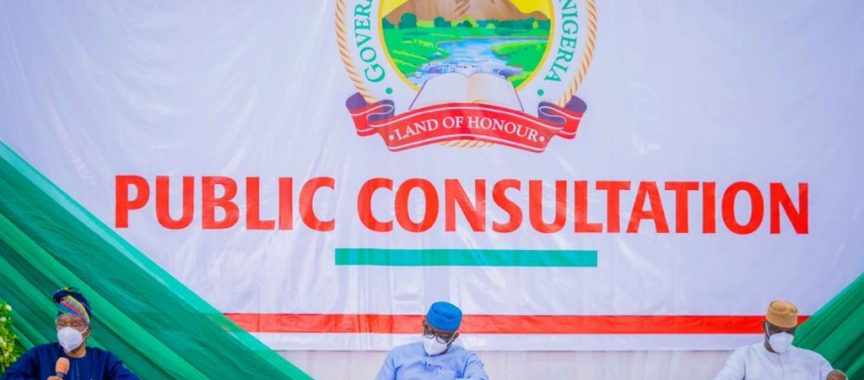…as CSOs, traditional rulers, others present positions
Governor of Ekiti State, Dr Kayode Fayemi, on Tuesday declared open a public consultation on the review of the 1999 Constitution (as amended) in Ado-Ekiti, with a call for the devolution of power and allocation of more resources to the federating units and building a nation where justice and peace reign.
The one day consultation was held to harmonise views of the Government and people of Ekiti State on the review process of the 1999 Constitution (as amended),
This is in furtherance to the announcement by the National Assembly on the commencement of the exercise as part of efforts aimed at ensuring active participation of Nigerians in the proposed alteration of some provisions of the 1999 Constitution.
The Consultation forum which was chaired by renowned Law Professor and former Vice Chancellor, Ekiti State University, Ado-Ekiti, Akin Oyebode, featured the paper presentation of the positions of the three arms of government, eminent personalities, and Civil Society Organisations.
Dr. Fayemi said the 1999 Constitution had been under severe criticism because it was largely a product of military decrees, adding that it did not emanate from process of public involvement, consultation nor pass through any referendum.
According to him, attempts to review, rewrite, amend and change the constitution have led to several conferences and discussions that were not inclusive due to the manner the conferences were conducted as well as the polarization of some of the debates.
“No doubt constitutional making and review have always been a challenging issue in any society, and the reason for the challenges is not farfetched. The constitution is expected to put together the value, commitment, aspiration, interest, and agreement of different groups, communities, and individuals.
“As polarizing as the issues are with meaningful engagement, all-inclusive participation, and gathering public opinion we can resolve the contention and agree on some of the issues in the interest of our nation. And as I have always stated that the interest of our dear nation should be placed far above personal interest.” The Governor said.
The Governor proposed that the idea of restructuring must be motivated by a generational responsibility to build a nation where justice and peace reign and made a call for devolution of power and allocation of more resources to the federating units.
He urged the review committee to critically work and concentrate on the defects of the 1999 Constitution and tap from the resources of constitutional reform veterans like Professor Oyebode, Bishop Ajakaiye, and Dr. Kunle Olajide who participated actively in the 2014 National Conference in order to enrich their suggestions and recommendations.
Earlier, the Chairman of the Consultation, Prof Akin Oyebode in his remarks described the 1999 Constitution as a military document, adding that this was not the first time Ekiti would be participating in the reform of the country’s constitution.
He lamented that the recommendations of the 2014 Constitutional Conference organised by the President Goodluck Jonathan administration have been conserved to a historical document.
Some of the speakers who made presentations at the forum included the Attorney General and Commissioner for Justice, Olawale Fapohunda; Speaker Ekiti State House of Assembly, Rt. Hon Funminiyi Afuye represented by his Deputy, Hakeem Jamiu; Chief Judge of Ekiti State, Justice Ayodeji Daramola represented by Justice John Adeyeye; Chairman Traditional Rulers Council and Alawe of Ilawe Ekiti, Oba Ajibade Alabi, Bishop, Catholic Diocese of Ekiti, Rev Felix Ajakaiye and Chairman Ekiti State Civil Society Organisation, Professor Christopher Oluwadare.
Major issues raised at the conference included, the need for financial autonomy of the legislature and judiciary, state and religion, gender equality for women and girls, public revenue, fiscal federalism and revenue allocation, Nigeria police reform and security architectures, local government autonomy, electoral reforms, and judicial reform.
Last modified: May 26, 2021

